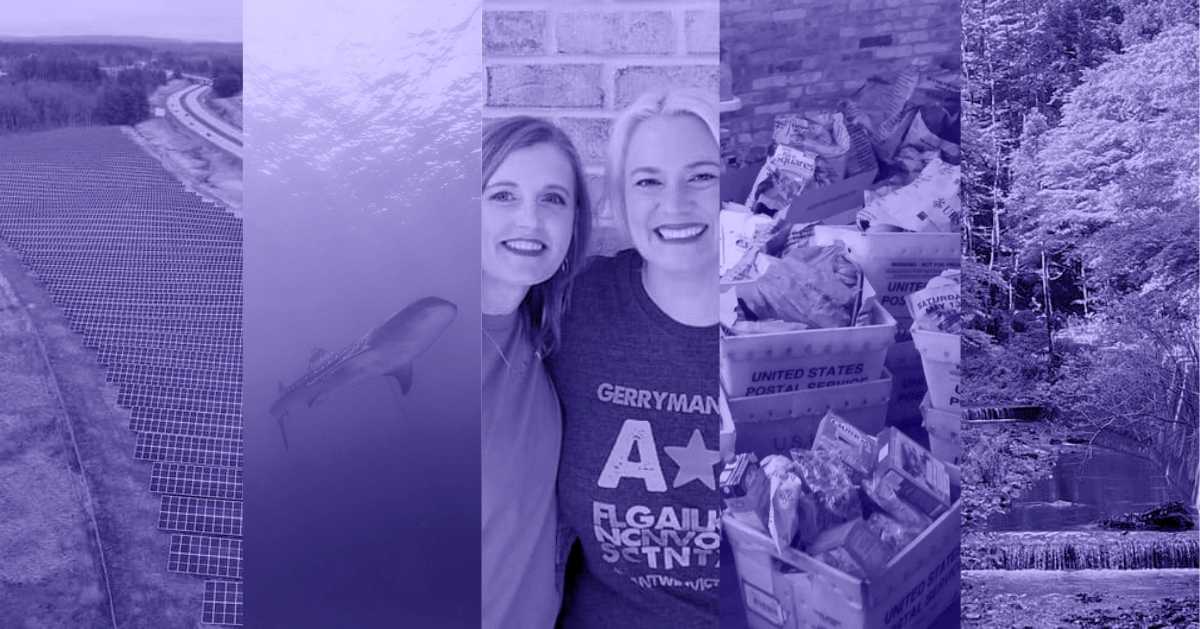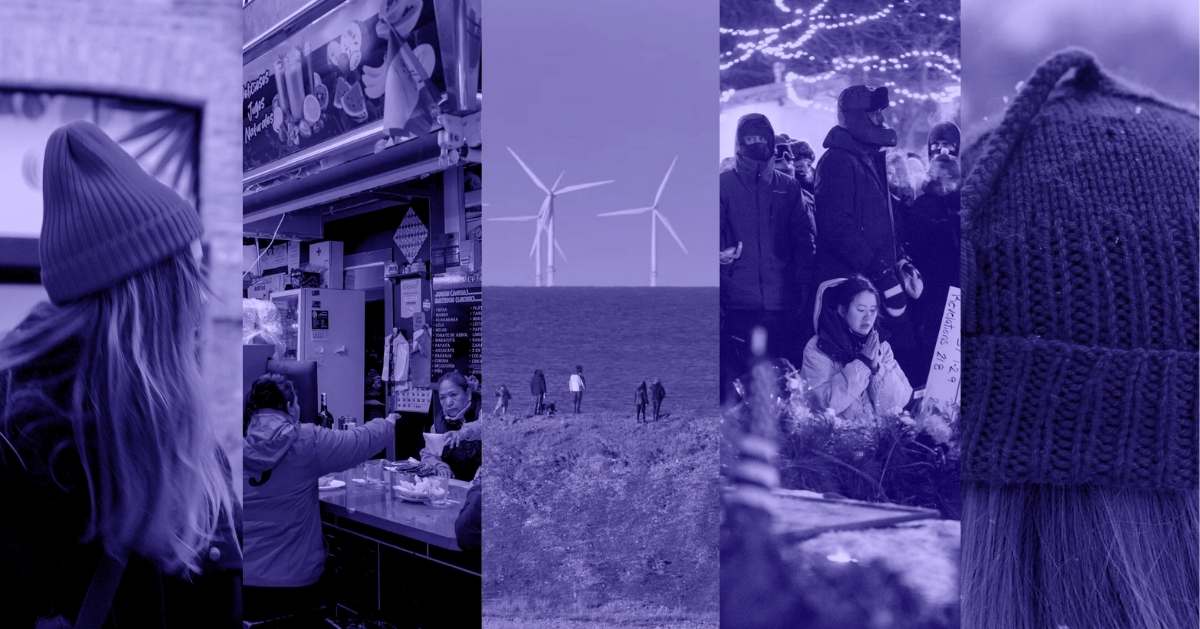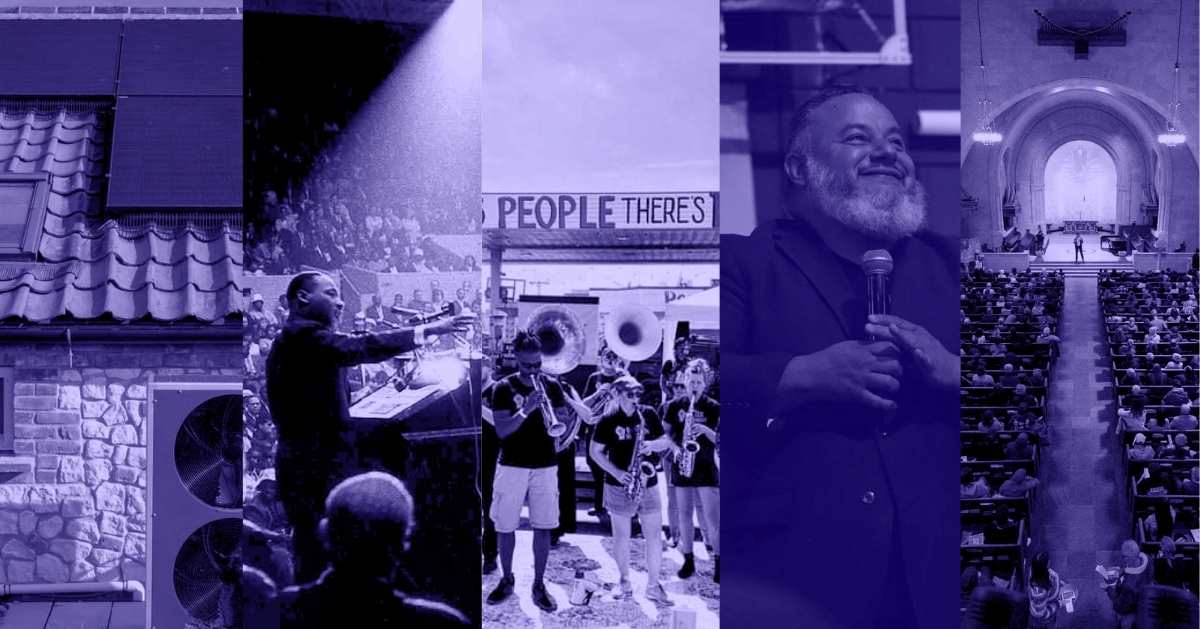Every day the Good Good Good team collects the best good news in the world and shares it with our community. Here are the highlights for this week!
If you want to get good news in your inbox every day, join the Goodnewsletter — the free daily newsletter designed to leave you feeling hopeful.
The Best Positive News We’re Celebrating This Week —
Global deforestation declined for the third decade in a row
While an estimated 489 million hectares — equivalent to about 750 million soccer fields — of forest have been lost globally through deforestation since 1990, the rate of loss has slowed every decade, too.
From 2015-2025, the deforestation rate was estimated to be 10.9 million hectares annually, down from 13.6 million hectares per year from 2000-2015, and 17.6 million hectares per year from 1990-2000.
Additionally, more than 90% of the world’s forests are regenerating naturally. The total area of these types of forests decreased between 1990 and 2025, but the rate of loss was cut in half over the same time period.
What’s the nuance? The rate of forest expansion also slowed, from 9.88 million hectares per year from 2000-2015, to 6.78 million hectares per year from 2015-2025. It’s certainly better than no reforestation — but we still have a lot of making up to do.
Hopeful people live better lives, a 14-year study of 25,000 participants finds
An analysis of 150 U.S. cities found one of the largest drops in gun violence ever
A new analysis of 150 U.S. cities found that, for more than three-quarters of cities with the most shootings, gun violence has been declining significantly. For more than half of those cities, the rate of decrease is even larger than last year, which set records for the lowest gun homicides.
The trend holds across “red” and “blue” cities and states and includes cities where shootings are typically the highest, like Baltimore, and where they’re lowest, like Austin, Texas.
Despite rhetoric about cities being “war-ravaged” and in need of National Guard presence, what’s actually true is that 80% of U.S. residents who live in cities will lose far fewer of their neighbors to gun violence this year.
In less than 24 hours, a Chicago suburb launched a community-wide food drive to help neighbors losing SNAP
By November 1, a sworn statement from the U.S. Department of Agriculture said that $4.65 billion from the Supplemental Nutrition Assistance Program’s contingency fund would “be obligated to cover 50% of eligible households’ current allotments” for November. But it could be weeks until the benefits actually reach people.
Within 24 hours of that official statement, more than 100 volunteers in Evanston, Illinois came together to drop off supplies for local food banks, like the Chicago Hope Food Pantry.
The emergency food drive brought in supplies by the thousands to help keep food on the table for people who would only be seeing a partial payment that month.
Even better: Although food assistance has been the biggest draw for food-insecure households, organizers also handed out know-your-rights cards and whistles in response to the increased presence of Immigration and Customs Enforcement throughout the city.
A Portland coffee shop’s free SNAP breakfast program sparked outrage online. Their response? ‘Everybody deserves a latte’
Connecticut and Maine are teaming up to fast-track renewables, helping more projects qualify for expiring federal incentives
Maine and Connecticut are collaborating to build renewable energy projects faster, as states with ambitious emissions reduction goals rush to take advantage of expiring federal tax credits. It could lead to a model for others to follow, too.
The two states are both working to get all their power from clean energy sources by 2040, and have been quickly looking for new ways to get projects underway.
Connecticut put out a request for proposals for solar and onshore wind projects in September, which included a provision to allow other states to participate. Maine took them up on it with the hope that by pooling demand and sharing information, both would have more efficient and viable projects at lower prices for residents.
Why is this good news? States have eight more months to take advantage of federal tax incentives on renewable energy projects included in the Inflation Reduction Act, which spurred massive investment in clean energy. The Trump administration is phasing those incentives out — states working together could help more projects meet the deadline.
→ Read more
Tired of AI slop? Here are 5 ways artificial intelligence is actually being used for good
A Miami man has cleared over 35,000 pounds of trash from the city’s mangroves
At least once a week, you can find Andrew Otazo in the thick of Miami’s mangroves. To date, he’s hauled more than 17 tons of trash out, mostly from the islands around Biscayne Bay.
He’s aiming to clean up as much as he can, but also to convince his neighbors to demand their elected officials take action to curb plastic pollution and improve outdated waste systems that result in street trash ending up in these critical ecosystems.
He says if it’s only up to him, “we’re doomed,” but if his work can help other people see the problem, “and they agree we need to work toward a solution, that’s the idea.”
→ Read more (Gifted link)
To fight gerrymandering, a new political coalition is backing candidates that are guaranteed to lose
When North Carolina’s Kate Barr ran for state senate last year, she lost — and that was the plan all along.
Barr knew her district had been gerrymandered to the point where she wouldn’t even have a chance at being elected, so she wanted to spotlight the injustice and the threat it poses to free and fair elections.
And now, she wants to expand the effort. Barr launched a new political coalition called the Can’t Win Victory Fund to recruit candidates who are guaranteed to lose. Not only will the coalition organize for a path to fairer maps, but it aims to improve voter turnout and bring awareness to power imbalances.
Why is this good news? Gerrymandering has been used to undermine democracy for centuries. Both major parties in the United States do it, and in 2022, North Carolina’s State Supreme Court even ruled that the state constitution allows partisan gerrymandering.
The Can’t Win Victory Fund gives the people a platform to fight back.
ALS made it impossible for this woman to walk her dog. Engineers invented a custom, adaptive leash just for her
→ Read more
A San Diego man invented a solar-powered backpack that turns into a bed and a generator for homeless people
Zac Clark created the Makeshift Traveler backpack after hearing feedback from unhoused people who “had phones but couldn’t charge them,” and had their belongings constantly “stolen or damaged.”
Beyond being a source of power, the hard-shell backpack also includes a tent, hygiene kit, lockbox, flashlight, sleeping bag, socks, and other essentials.
Since it launched in October 2022, more than 1,200 Makeshift Traveler backpacks have been distributed at no cost to people experiencing homelessness in 25 cities throughout California.
The High Seas Treaty won one of five 2025 Earthshot Prizes for its work to revive and protect the world’s oceans
The winners of the 2025 Earthshot Prizes were just announced, and the High Seas Treaty was one of them. It’s a historic recognition of an almost two-decade global effort to protect half of the planet that lies beyond national jurisdiction.
In September, the High Seas Treaty reached the 60-ratification threshold needed, triggering it to enter into force in January 2026 — a huge and historic milestone for ocean protection as it’s the world’s first treaty to protect marine biodiversity in international waters.
A total of 75 countries have now ratified it, indicating their consent to adhere to the new international law.
Why is this good news? The £1 million Earthshot Prize comes at a critical time, since once the treaty is in force, governments and civil society must then work together to turn commitments into action.
You may also like: World’s first ‘upcycled skyscraper’ could be blueprint for a ‘waste-free future.’ It’s a finalist for the Earthshot Prize
From tiny homes to factory renovations, cities build subsidized housing for teachers
Ms. Rachel wore an upcycled dress embroidered with artwork by Gazan children to the Glamour Women of the Year Awards
Ahead of this week’s Glamour Women of the Year Awards, Ms. Rachel, an honoree, asked kids from Gaza to make artwork that told their stories. She then had their drawings embroidered onto an upcycled dress to wear to the event, part of her continued advocacy for children in Gaza and around the world.
On the red carpet, she shared that the kids all knew about the dress and were “so excited.” And in her acceptance speech, Ms. Rachel touched each drawing as she said the name of the child who drew it.
On Instagram, she tagged each of the children’s accounts who made artwork for the dress, and said that she’d personally made a donation to each of them.
→ Read more
More good news of the week —
Scientists are building cyborg cockroaches to create the world’s smallest search and rescue workers. “We see a future where after an urban disaster like an earthquake or a bombing, where humans can’t safely access the disaster site, being able to send in a bunch of cyborg beetles to navigate the disaster zone quickly and efficiently.”
Students of color benefit from meditation in schools, so Atlanta is investing in mindfulness programs across its public schools. Social-emotional learning, including meditation, yoga, and mindfulness breaks, is becoming more commonplace in schools across the country, and reports have found these initiatives are even more beneficial among under-resourced communities.
Billionaire MacKenzie Scott donated $60 million to counter cuts to federal emergency assistance and diversity programs. (Gifted link) She made the donation to the Center for Disaster Philanthropy, a nonprofit group that helps improve disaster resilience and recovery in struggling communities that otherwise lack the resources to rebuild.
Germany is giving more than $1 billion for Holocaust survivors’ home care around the world in 2026. The compensation was negotiated with Germany’s finance ministry and is the largest budget for frail and vulnerable Holocaust survivor home care in the organization’s history.
Backed by the Gates Foundation, a U.S. company is using virtual reality to show people the life-saving power of vaccines. “In a world where people are increasingly skeptical of science, showing the human impact of vaccines is vital. When you see the faces of families in the Congo who walk for hours just to reach a clinic, you understand what’s at stake.”
A pay-what-you-can cafe and food truck in Raleigh, North Carolina is preparing to support its community in the face of SNAP cuts. Since they opened in January 2018, A Place At The Table has served 100,000 cups of coffee and 255,000 meals to people in need — thanks to the help of over 2,000 volunteers annually.
New York City’s first “free food vending machine” offers eggs, meat, and fresh produce to people in need. The nonprofit behind it said, “After over 15,500 lbs of free food distributed to more than 1,100 families in NYC, we’re hoping this new model for distribution can provide folks with good food easily and when they need or want it.”
A new national law in South Korea will turn large parking lots into solar power farms. Starting this month, parking lots in South Korea with more than 80 spaces will be required to install solar canopies and carports, and the law applies to both new and existing parking lots.
Ahead of hosting COP30, Brazil announced that deforestation in the country hit an 11-year low. President Luiz Inacio Lula da Silva has pledged to end all deforestation in the country by 2030. Since the beginning of his term in 2023, Amazon destruction has been cut by half.
Selena Gomez raised $600,000 for mental health charities through her annual Rare Impact Fund benefit. The $600,000 raised on site via commitments from the night’s guests makes up just one big step in the Rare Impact Fund’s mission to generate $100 million for global mental health resources and education programs.
Finland “rewilded” some of its preschools, and it’s had incredible health benefits for children. The experiment was part of a growing body of research linking two layers of biodiversity, going deeper into existing knowledge that access to outdoor space is important for children and their development.
A police chief in Colorado is pushing back against ICE following an altercation with a protester. (Gifted link) The state’s law enforcement office is investigating an incident where an immigration agent appears to put a protester into what the chief saw as a chokehold and then threw her down an embankment.
Inspired by spiders, biologists are creating artificial webs to capture airborne DNA and monitor biodiversity. With the global crisis of diminishing biological diversity challenging scientists’ ability to monitor changes in ecosystems, this new technique aims to capture airborne DNA on a commercial scale to capture signals of land-based biodiversity.
A couple in Salt Lake City builds and distributes beds to their neighbors in need. Together with a team of volunteers, Laura Potts and Andrew Heaton opened a local chapter of Sleep in Heavenly Peace, whose goal is to ensure no child sleeps on the floor.
Canada introduced a new gravity battery that could power tall buildings using an elevator-style energy storage system. The system harnesses the energy generated by solar panels and wind turbines to lift a heavy mass within a shaft during the charging phase. This stored potential energy is then released to rotate an electric generator during discharge.
Jimmy Kimmel is hosting a food donation center to help those affected by the cuts to SNAP benefits. Kimmel encouraged locals to donate food to the “Jimmy Kimmel Live Big Beautiful Food Bank,” and those who are not local were encouraged to “consider supporting your local food banks.”
A new project in Milwaukee broke ground on 40 tiny homes for homeless U.S. military veterans. The project aims to overcome barriers found in traditional shelters by allowing for privacy, property, and pets and will include on-site services and resources to address underlying causes of homelessness, such as mental health challenges or substance addiction.
One of the country’s first “100% free full-service” grocery stores operates inside a Baltimore library. With “no income requirements and no ID needed,” two days a week, customers are welcome to grab whatever they can fit in a library-supplied bag from the Pratt Free Market, which is 90% volunteer-run and stocked like any other grocery store.
Residents of a village in England crafted thousands of poppies to create a giant Remembrance Day installation at their local church. Volunteers in Wool knit and crocheted more than 5,000 individual poppies by hand, which were then attached to an 18m-long cargo net which now hangs from the 13.2m-tall church bell tower to honor armed forces members who died in the line of duty.
A tech startup makes a free app for SNAP recipients, and now, it’s giving them $50 cash, too. About 5 million people use Propel’s app to check their SNAP balances, and get coupons and discounts on groceries, and is prioritizing distributing the cash payments to recipients with children or little to no income to help them keep food on the table.
Researchers created a gel that can restore tooth enamel and could prevent cavities. Achieving something previously thought to be impossible, the innovative gel forms a layer over teeth and then recruits calcium and phosphate ions from saliva to build new enamel.
Volunteers are reading and giving books to children who live in “book deserts” to foster literacy. The LiTEArary Society, an international group started in West Virginia, works to get new picture books to preschool children to develop a love of reading.
Pope Leo XIV met with abuse survivors and activists in a “historic and hope-filled step toward greater cooperation.” Six members of the ECA Global (Ending Clergy Abuse) board of directors met with the pope, representing its members from more than 30 countries on six continents, including activists and survivors of sexual abuse by representatives of the Catholic Church.
Countries in Africa’s “meningitis belt” have started rolling out a new vaccine to turn the tide on its regular epidemics. The five-in-one vaccine targets the varieties of Neisseria meningitidis bacteria that are responsible for almost all epidemic meningitis in sub-Saharan Africa, which kill tens of thousands of people every few years.
Meta’s AI glasses could bring more independence for the blind community. While Meta originally designed them for other purposes, the blind community has been able to connect their glasses to the “Be My Eyes” app, use the optical character recognition to recognize and read text aloud, and more.



